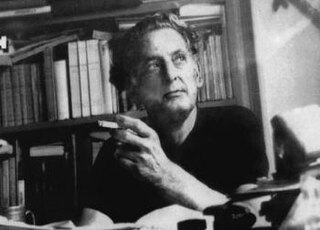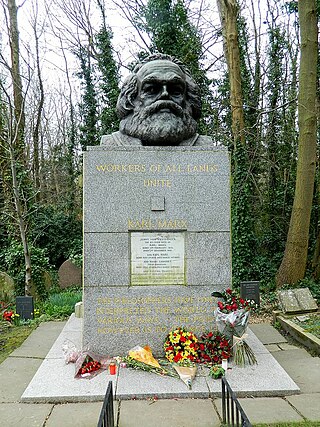
The Bolsheviks, led by Vladimir Lenin, were a far-left faction of the Marxist Russian Social Democratic Labour Party (RSDLP) which split with the Mensheviks at the Second Party Congress in 1903. The Bolshevik party seized power in Russia in the October Revolution of 1917, and was later renamed the Communist Party of the Soviet Union. Their ideology and practices, based on Leninist and later Marxist–Leninist principles, are known as Bolshevism.
Libertarian socialism is an anti-authoritarian and anti-capitalist political current that emphasises self-governance and workers' self-management. It is contrasted from other forms of socialism by its rejection of state ownership and from other forms of libertarianism by its rejection of private property. Broadly defined, it includes schools of both anarchism and Marxism, as well as other tendencies that oppose the state and capitalism.

The Russian Revolution was a period of political and social change in the Russian Empire, starting in 1917. This period saw Russia abolish its monarchy and adopt a socialist form of government following two successive revolutions and a bloody civil war. The Russian Revolution can also be seen as the precursor for the other European revolutions that occurred during or in the aftermath of World War I, such as the German Revolution of 1918–1919.

Trotskyism is the political ideology and branch of Marxism developed by Russian revolutionary Leon Trotsky and some other members of the Left Opposition and Fourth International. Trotsky described himself as an orthodox Marxist, a revolutionary Marxist, and a Bolshevik–Leninist as well as a follower of Marx, Engels, Vladimir Lenin, Karl Liebknecht, and Rosa Luxemburg.

Socialism in New Zealand had little traction in early colonial New Zealand but developed as a political movement around the beginning of the 20th century. Much of socialism's early growth was found in the labour movement.

Grandizo Munis was a Spanish Trotskyist politician. He is considered to have become a left communist following his break with the Fourth International.
The Right Opposition or Right Tendency in the All-Union Communist Party (Bolsheviks) was a conditional label formulated by Joseph Stalin in autumn of 1928 in regards to the opposition against certain measures included within the first five-year plan, an opposition which was led by Nikolai Bukharin, Alexei Rykov, Mikhail Tomsky and their supporters within the Soviet Union that did not follow the so called "general line of the party". It is also the name given to "right-wing" critics within the Communist movement internationally, particularly those who coalesced in the International Communist Opposition, regardless of whether they identified with Bukharin and Rykov.
The Revolutionary Socialist League (RSL) was a Trotskyist group in the United States established in 1973 and disbanded in 1989.

Teamsters for a Democratic Union (TDU) is a grassroots rank and file organization whose goal is to reform the International Brotherhood of Teamsters (IBT), or Teamsters Union. The organization has chapters nationwide in the United States and Canada.
The Workers League was a Trotskyist political party in Ireland.

Anarchism in Ireland has its roots in the stateless organisation of the tuatha in Gaelic Ireland. It first began to emerge from the libertarian socialist tendencies within the Irish republican movement, with anarchist individuals and organisations sprouting out of the resurgent socialist movement during the 1880s, particularly gaining prominence during the time of the Dublin Socialist League.

The Argentine Regional Workers' Federation, founded in 1901, was Argentina's first national labor confederation. It split into two wings in 1915, the larger of which merged into the Argentine Syndicates' Union (USA) in 1922, while the smaller slowly disappeared in the 1930s.
Under a variety of names and within a number of organizations over at least 17 years, the group around Harry Turner, or Turnerites was a presence within Trotskyism in the United States.
Socialism in Australia dates back at least as far as the late-19th century. Notions of socialism in Australia have taken many different forms including utopian nationalism in the style of Edward Bellamy, the democratic socialist reformist electoral project of the early Australian Labor Party (ALP), and the revolutionary Marxism of parties such as the Communist Party of Australia.
The International Socialists (1968–1986) was a Third Camp Trotskyist group in the United States.
The International Communist League (Fourth Internationalist), earlier known as the international Spartacist tendency (iSt) is a Trotskyist international. Its largest constituent party is the Spartacist League (US). There are smaller sections of the ICL (FI) in Mexico, Canada, France, Germany, Ireland, Italy, Japan, South Africa, Australia, Greece and the United Kingdom.

The Workers World Party (WWP) is a Marxist–Leninist communist party founded in 1959 by a group led by Sam Marcy. WWP members are sometimes called Marcyites. Marcy and his followers split from the Socialist Workers Party (SWP) in 1958 over a series of long-standing differences, among them their support for Henry A. Wallace's Progressive Party in 1948, their view of People's Republic of China as a workers' state, and their defense of the 1956 Soviet intervention in Hungary, some of which the SWP opposed.

World revolution is the Marxist concept of overthrowing capitalism in all countries through the conscious revolutionary action of the organized working class. For theorists, these revolutions will not necessarily occur simultaneously, but where and when local conditions allow a revolutionary party to successfully replace bourgeois ownership and rule, and install a workers' state based on social ownership of the means of production. In most Marxist schools, such as Trotskyism and Communist Left, the essentially international character of the class struggle and the necessity of global scope are critical elements and a chief explanation of the failure of socialism in one country.

The Socialist Workers Party (SWP) is a Trotskyist communist party in the United States. The SWP began as a group that was expelled from the Communist Party USA for supporting Leon Trotsky over Soviet leader Joseph Stalin.

Far-left politics in the United Kingdom have existed since at least the 1840s, with the formation of various organisations following ideologies such as Marxism, revolutionary socialism, communism, anarchism and syndicalism.












